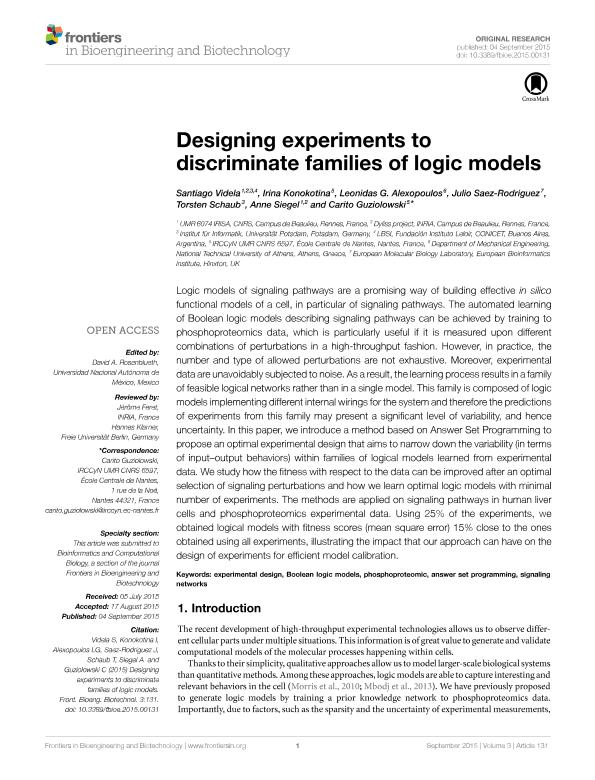Mostrar el registro sencillo del ítem
dc.contributor.author
Videla, Santiago

dc.contributor.author
Konokotina, Irina
dc.contributor.author
Alexopoulos, Leonidas G.
dc.contributor.author
Saez Rodriguez, Julio
dc.contributor.author
Schaub, Torsten
dc.contributor.author
Siegel, Anne
dc.contributor.author
Guziolowski, Carito
dc.date.available
2017-03-29T19:06:45Z
dc.date.issued
2015-09-04
dc.identifier.citation
Videla, Santiago; Konokotina, Irina; Alexopoulos, Leonidas G.; Saez Rodriguez, Julio; Schaub, Torsten; et al.; Designing Experiments to Discriminate Families of Logic Models; Frontiers Media; Frontiers in Bioengineering and Biotechnology; 3; 04-9-2015; 131
dc.identifier.uri
http://hdl.handle.net/11336/14465
dc.description.abstract
Logic models of signaling pathways are a promising way of building effective in silico functional models of a cell, in particular of signaling pathways. The automated learning of Boolean logic models describing signaling pathways can be achieved by training to phosphoproteomics data, which is particularly useful if it is measured upon different combinations of perturbations in a high-throughput fashion. However, in practice, the number and type of allowed perturbations are not exhaustive. Moreover, experimental data are unavoidably subjected to noise. As a result, the learning process results in a family of feasible logical networks rather than in a single model. This family is composed of logic models implementing different internal wirings for the system and therefore the predictions of experiments from this family may present a significant level of variability, and hence uncertainty. In this paper, we introduce a method based on Answer Set Programming to propose an optimal experimental design that aims to narrow down the variability (in terms of input-output behaviors) within families of logical models learned from experimental data. We study how the fitness with respect to the data can be improved after an optimal selection of signaling perturbations and how we learn optimal logic models with minimal number of experiments. The methods are applied on signaling pathways in human liver cells and phosphoproteomics experimental data. Using 25% of the experiments, we obtained logical models with fitness scores (mean square error) 15% close to the ones obtained using all experiments, illustrating the impact that our approach can have on the design of experiments for efficient model calibration.
dc.format
application/pdf
dc.language.iso
eng
dc.publisher
Frontiers Media
dc.rights
info:eu-repo/semantics/openAccess
dc.rights.uri
https://creativecommons.org/licenses/by-nc-sa/2.5/ar/
dc.subject
Experimental Design
dc.subject
Boolean Logic Models
dc.subject
Answer Set Programming
dc.subject
Signaling Networks
dc.subject.classification
Ciencias de la Información y Bioinformática

dc.subject.classification
Ciencias de la Computación e Información

dc.subject.classification
CIENCIAS NATURALES Y EXACTAS

dc.title
Designing Experiments to Discriminate Families of Logic Models
dc.type
info:eu-repo/semantics/article
dc.type
info:ar-repo/semantics/artículo
dc.type
info:eu-repo/semantics/publishedVersion
dc.date.updated
2016-12-16T17:27:02Z
dc.identifier.eissn
2296-4185
dc.journal.volume
3
dc.journal.pagination
131
dc.journal.pais
Suiza

dc.journal.ciudad
Lausanne
dc.description.fil
Fil: Videla, Santiago. Consejo Nacional de Investigaciones Cientificas y Tecnicas. Oficina de Coordinacion Administrativa Pque. Centenario. Instituto de Investigaciones Bioquimicas de Buenos Airesfundacion Instituto Leloir. Instituto de Investigaciones Bioquimicas de Buenos Aires; Argentina. Fundación Instituto Leloir; Argentina. Centre National de la Recherche Scientifique; Francia. Institut National de Recherche en Informatique et en Automatique; Francia. Universität Potsdam. Institut für Informatik; Alemania
dc.description.fil
Fil: Konokotina, Irina. Centre National de la Recherche Scientifique; Francia
dc.description.fil
Fil: Alexopoulos, Leonidas G.. Universidad Nacional y Kapodistriaca de Atenas; Grecia
dc.description.fil
Fil: Saez Rodriguez, Julio. European Bioinformatics Institute. European Molecular Biology Laboratory; Reino Unido
dc.description.fil
Fil: Schaub, Torsten. Universität Potsdam. Institut für Informatik; Alemania
dc.description.fil
Fil: Siegel, Anne. Centre National de la Recherche Scientifique; Francia. Institut National de Recherche en Informatique et en Automatique; Francia
dc.description.fil
Fil: Guziolowski, Carito. Centre National de la Recherche Scientifique; Francia
dc.journal.title
Frontiers in Bioengineering and Biotechnology
dc.relation.alternativeid
info:eu-repo/semantics/altIdentifier/url/http://journal.frontiersin.org/article/10.3389/fbioe.2015.00131/full
dc.relation.alternativeid
info:eu-repo/semantics/altIdentifier/doi/https://doi.org/10.3389/fbioe.2015.00131
Archivos asociados
